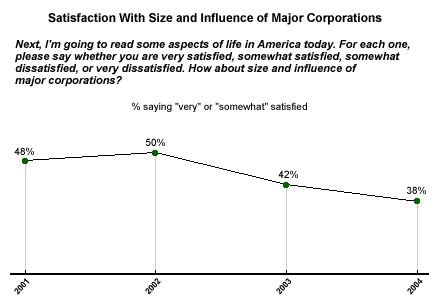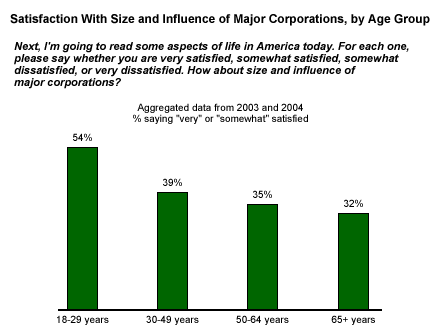Big business has taken a big hit in the last several years. The corporate accounting scandals that surfaced in early 2002 caused thousands of employees to lose their jobs and retirement savings, and cost investors millions. The 2002 corporate crisis was followed by the mutual fund scandals of 2003, and most recently by election-year furor over corporate outsourcing of jobs overseas.
As part of its annual Mood of the Nation poll*, Gallup asks Americans how satisfied they are with the "size and influence of major corporations." Not surprisingly, the public's satisfaction level with corporate America has declined over the past few years. But younger Americans appear to be more optimistic than their older counterparts are in this respect.
According to the January 2004 survey, slightly more than a third of Americans (38%) said they are "very" or "somewhat" satisfied with the size and influence of major corporations -- a rating that has fallen 12 percentage points since early 2002.

But some may be surprised to learn that while the general public has little use for big business these days, young Americans (those aged 18 to 29) are far more bullish about major corporations. Aggregated data from 2003 and 2004** reveal that a slim majority of young Americans (54%) say they are very or somewhat satisfied with the size and influence of major corporations -- 15 percentage points higher than the next-most optimistic age group, 30- to 49-year-olds. Satisfaction with major corporations decreases even more among the older age groups.

One might think that the youngest group of Americans simply lacks experience in the business world, or is less likely to follow news about the latest scandals on a regular basis. But this may be an oversimplification. Dennis Jacobe, Gallup's chief economist, suggests that adults under the age of 30 -- many of whom entered into corporate life at the height of the technology boom -- may have had a different introduction into business practices than their older counterparts did. More specifically, Jacobe believes that younger Americans' positivity could relate to the following factors:
- Respect for companies with dominant market positions, such as Microsoft, grew during the computer revolution of the late 20th century.
- The impact of job losses from things such as outsourcing has not been as severe for younger Americans as it has been for older, more experienced workers.
- The federal government doesn't pursue monopolies the way it did in the past, therefore, young people do not have such a negative view of monopolies.
- Many young investors made money during the technology boom.
- Antitrust laws are not emphasized in business school the way they once were.
Bottom Line
Despite a major effort by corporations to upgrade their ethical standards and the introduction of the Sarbanes-Oxley Act in 2002, the public remains wary of big business. But there is hope for corporate America. The Sarbanes-Oxley Act mandates better internal controls and increased oversight requirements for publicly held companies, in an effort to restore public confidence after years of corporate mismanagement.
These efforts, in combination with the more optimistic opinions of young people, may push public perceptions of corporate America north, rather than south, in the near future -- particularly if we see significant job creation in the months ahead.
*Results are based on telephone interviews with 1,004 national adults, aged 18 and older, conducted Jan. 12-15, 2004. For results based on the total sample of national adults, one can say with 95% confidence that the margin of sampling error is ±3 percentage points.
**Results are based on aggregated data from telephone interviews with 2,004 national adults, aged 18 and older, conducted Jan. 12-15, 2004, and Jan. 13-16, 2003.